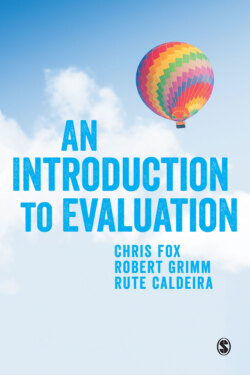Читать книгу An Introduction to Evaluation - Chris Fox - Страница 25
На сайте Литреса книга снята с продажи.
Theory-led evaluation
ОглавлениеDonaldson and Lipsey note that:
Reference to theory is widespread in the contemporary evaluation literature, but what is meant by ‘theory’ encompasses a confusing mix of concepts ... A newcomer to evaluation, and even a grizzled veteran, could have a difficult time sorting through the closely related and sometimes interchangeable terms that litter the evaluation landscape ... (Donaldson and Lipsey 2006: 57)
As Donaldson and Lipsey note, the challenge here is partly that terms are used inconsistently and with overlapping meanings, but also partly that the role of theory in evaluation is contentious. They suggest that there are three common types of theory encountered in evaluation:
Evaluation theories are theories of evaluation practice that address questions such as how to understand the nature of what we evaluate, how to assign value to the things we evaluate and their performance, how to construct knowledge, and how to use the knowledge generated by evaluation.
Social science theories attempt to explain the social world, and when they address social phenomena related to social programmes and the social conditions they are intended to improve, those social theories can be very relevant to evaluation.
Theory-based evaluation places emphasis on developing programme theory as an integral component of the evaluation process. It is more modest than social theory and deals with the assumptions that guide the way specific policies, programmes and projects are implemented, and are expected to bring about change.
